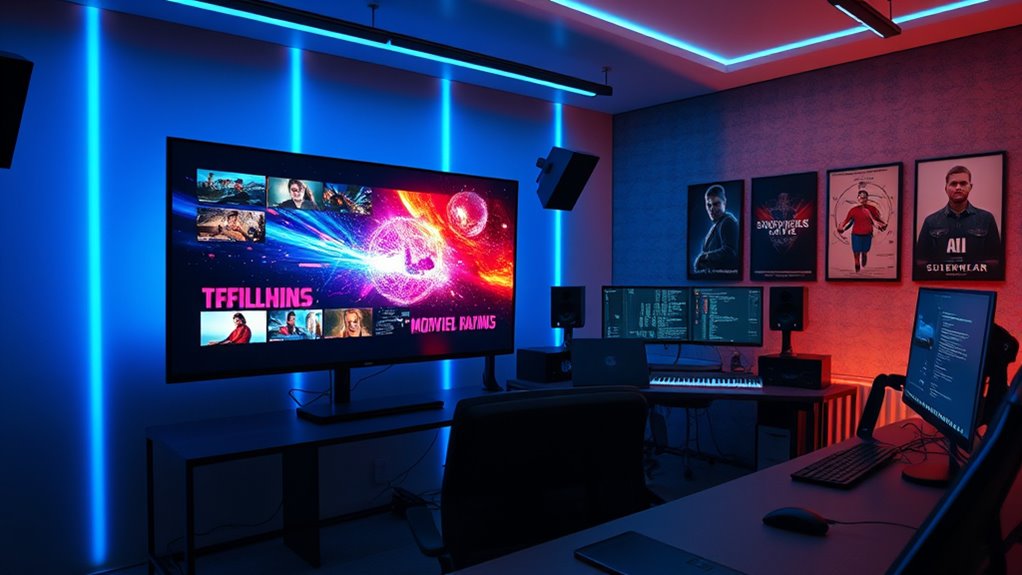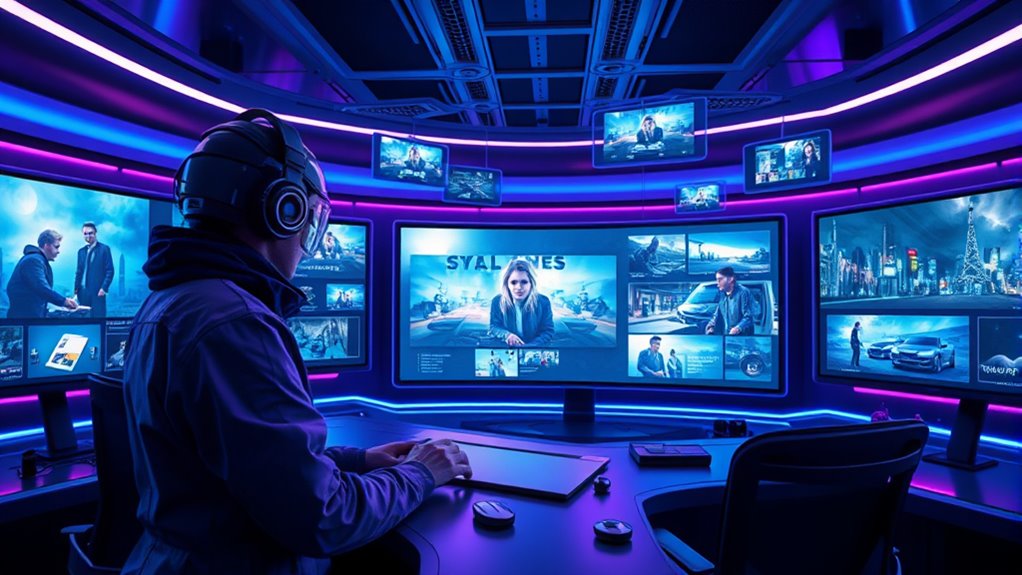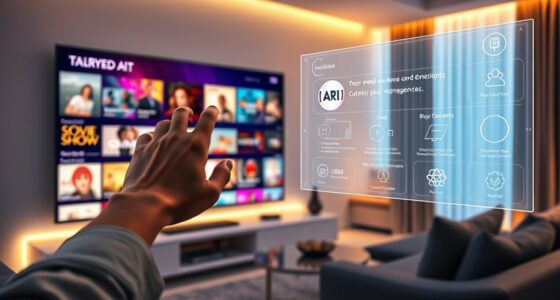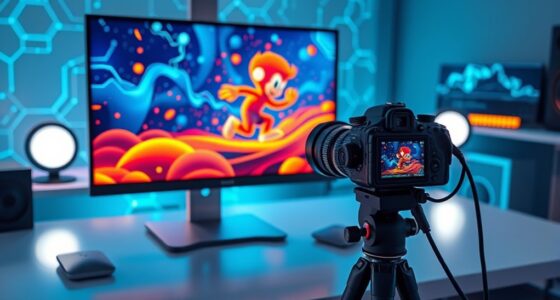AI transforms how you create adaptive movie trailers by automating visual, audio, and script elements, making personalization faster and more targeted. With AI, you can tailor trailers to specific audiences based on data about viewer preferences, trends, and demographics. This means your trailers become more engaging and relevant, boosting audience interest. If you want to discover how AI tools are shaping the future of dynamic trailer creation, keep exploring the innovative ways technology is changing movie promotion.
Key Takeaways
- AI analyzes viewer data to dynamically customize trailer content for different audience segments.
- Automated editing tools adapt trailer scenes and pacing based on real-time audience preferences.
- AI-generated visual and audio elements enable personalized trailer variations tailored to individual viewers.
- Machine learning models predict which trailer components will resonate most with specific demographics.
- Adaptive trailers created by AI enhance engagement and increase marketing effectiveness through personalization.

Artificial intelligence is transforming how movie trailers are created and tailored to audiences. You might not realize it, but AI tools like Midjourney, Dolly 3, and 11 Labs are now essential in producing stunning imagery, animations, and voice-overs for trailers. These platforms enable filmmakers to generate entire trailers, including background music and sound effects, using services like Mubert and Bark. This automation streamlines the entire process, allowing you to craft engaging trailers faster than ever before. AI can analyze viewer preferences, trends, and demographic data to adapt trailers specifically for different audience segments, making each preview more personalized and impactful.
One of the biggest advantages AI offers is time efficiency. Instead of spending weeks or months on trailer production, AI reduces that timeline to mere hours. This rapid turnaround means you can respond quickly to market changes, release multiple versions tailored to various regions or audiences, and keep the promotional cycle dynamic and flexible. Cost savings also come into play, as AI automates tasks that traditionally require large teams of editors, designers, and sound engineers. By automating these steps, you cut costs and allocate resources to other creative areas, boosting your overall production value without overspending. Additionally, AI-driven content analysis helps identify the most compelling elements to include in trailers, further enhancing their effectiveness. Incorporating audience preferences and feedback into the process allows for even more targeted and impactful trailers. Moreover, AI can assist in predicting audience engagement, enabling marketers to refine their strategies and maximize reach.
AI’s role extends beyond just creating trailers; it also enhances the entire process. You can use AI to generate script ideas that guide the narrative and visual flow, select the best footage from hours of raw film, and assist with automated editing to assemble scenes into a polished trailer. Sound design is also streamlined, with AI tools producing tailored sound effects and background music that match the trailer’s tone and style. This collaborative approach allows human editors to focus on refining and adding creative touches, working alongside AI to produce a final product that’s both high-quality and engaging. Furthermore, advancements in AI-generated imagery, such as those from platforms like Midjourney, open up new creative possibilities for visual storytelling that were previously too costly or time-consuming. The integration of deep learning techniques further enhances AI’s ability to understand and replicate artistic styles, leading to more visually compelling trailers.
The benefits of using AI in trailer creation are clear. You gain increased efficiency, significant cost reductions, and the ability to personalize content for different audiences. This not only broadens your market reach but also fosters innovation, as AI opens up new creative possibilities that weren’t feasible before. Major Hollywood studios and streaming services like Netflix are already investing heavily in AI technology, recognizing its potential to keep them competitive. Smaller production companies also benefit from affordable AI solutions, gaining access to high-quality trailer creation that levels the playing field.
While AI offers numerous advantages, it’s not without challenges. Ethical questions about AI’s role in creative processes and potential over-reliance on automation remain. Nonetheless, as technology continues to advance, the integration of AI into trailer production is poised to expand, revolutionizing how movies are promoted and experienced by audiences worldwide. The ongoing evolution of AI-driven tools promises to further refine and personalize the promotional content in exciting new ways.
Frequently Asked Questions
How Does AI Analyze Viewer Preferences for Trailer Customization?
You’re asking how AI analyzes viewer preferences for trailer customization. It collects data from your explicit inputs like ratings and comments, and implicit behaviors such as watch time and skips. AI then uses machine learning to detect patterns, compare your tastes with others, and interpret social media sentiment. This continuous process updates your profile, allowing AI to personalize trailers by adjusting scenes, music, and effects to match your evolving preferences.
What Ethical Concerns Arise From Ai-Generated Trailers?
Did you know that 60% of audiences struggle to tell real trailers from AI-generated ones? You might be concerned about ethical issues like deception, where viewers are misled into thinking a movie exists. AI trailers can infringe on actors’ rights and violate copyrights, risking legal trouble. They also threaten trust in the industry, as people can’t always distinguish genuine content from AI-made, raising questions about transparency and authenticity.
Can AI Adapt Trailers in Real-Time During Movie Screenings?
You wonder if AI can adapt trailers during movie screenings. Currently, it’s challenging because of technical limitations like synchronization and infrastructure. While AI can analyze audience reactions and customize trailers beforehand, real-time adaptation during a screening isn’t common yet. You’d need seamless integration with projection systems and rapid data processing, which are complex. Future advancements might make live trailer adjustments possible, but for now, it’s mostly a pre-production tool.
How Do AI Algorithms Ensure Trailer Content Remains Accurate?
You want to know how AI algorithms keep trailer content accurate. They analyze the movie’s narrative, sentiment, and key moments using neural networks and graph models. AI compares generated trailers with human-made ones and uses feedback to improve. Continuous training on diverse data helps AI better understand complex emotions and themes. Combining multiple data types, like text and visuals, guarantees trailers stay aligned with the movie’s tone and story.
What Impact Does AI Have on Traditional Trailer Editing Jobs?
Imagine a skilled craftsman shaping a sculpture; AI acts as a helpful apprentice, taking on repetitive tasks like assembling rough cuts. You, as an editor, can focus on the creative details that truly bring the work to life. While some jobs may fade like old chisels, new skills become essential. AI boosts your productivity, but your artistic touch remains crucial in crafting compelling trailers.
Conclusion
Imagine a world where every trailer you see feels personally crafted just for you. AI’s ability to create adaptive movie trailers is revolutionizing how we experience previews, making them more engaging and tailored. As technology continues to evolve, isn’t it exciting to think that your next favorite trailer might be just a click away, perfectly matched to your tastes? The future of cinema is here—ready to transform your movie nights into unforgettable adventures.










